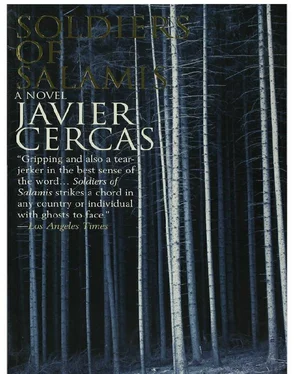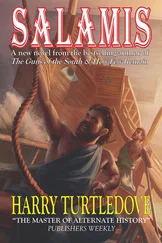God desired, in his power,
to blend four little sunbeams
and make of them a woman
and when His will was done
in a Spanish garden I was born
like a flower on her rose-bush.
Glorious land of my love,
blessed land of perfume and passion,
Spain, in each flower at your feet
a heart is sighing.
Oh, I'm dying of sorrow,
for I'm going away, Spain, from you,
for away from my rose-bush I'm torn.*
Listening to the Gypsies play and sing I thought it was the saddest song in the world; also, barely admitting it to myself, that I wouldn't mind dancing to it one day. When they finished their act, I tossed a hundred pesetas in the Gypsy woman's hat and, as the people started leaving the terrace, I finished off my gin and tonic and left.
When I got home I had a message on my answering machine from Figueras. He apologized and said something unexpected had arisen at the last minute and kept him from turning up to meet me; he asked me to call him. I called him. He apologized again and suggested another meeting.
'I have something for you,' he added.
'What?'
'I'll give it to you when we see each other.'
I told him I was going on holiday the following day (I was embarrassed to tell him I was going to Cancún) and wouldn't be back for a fortnight. We arranged to meet in the Núria in two weeks' time and, after going through the idiotic exercise of superficially describing ourselves to each other, said goodbye.
The Cancún thing was unspeakable. Conchi, who'd organized the trip, had hidden the fact that, except for a couple of excursions into the Yucatan peninsula and many afternoon shopping trips to the city centre, the whole thing amounted to spending two weeks trapped in a hotel with a gang of Catalans, Andalusians and North Americans ruled by a whistle-wielding tour guide and two monitors who had no understanding of the concept of rest and spoke not a word of Spanish; I'd be lying if I denied it had been years since I'd been so happy. And strange as it may seem, I believe without the stay in Cancún (or in a hotel in Cancún) I'd never have decided to write a book about Sánchez Mazas, because over the course of those days I had time to put my ideas about him in order and came to realize that the character and his story had over time turned into one of those obsessions that constitute the indispensable fuel for writing. Sitting on the balcony of my room with a mojito in hand, while watching how Conchi and her gang of Catalans, Andalusians and North Americans were relentlessly pursued, the length and breadth of the hotel, by the fury of the sports monitors ('Now, swimming-pool!'), I couldn't stop thinking about Sánchez Mazas. I soon arrived at a conclusion: the more I knew about him, the less I understood him; the less I understood him, the more he intrigued me; the more he intrigued me, the more I wanted to know about him. I had known — but not understood and was intrigued — that cultured, refined, melancholic and conservative man, bereft of physical courage and allergic to violence, undoubtedly because he knew himself incapable of exercising it, had worked during the twenties and thirties harder than almost anyone so that his country would be submerged in a savage orgy of blood. I don't know who it was who said: no matter who wins a war, the poets always lose. I do know that, just before my vacation in Cancún, I'd read that, on 29 October 1933, in the first public act of the Spanish Falange in the Madrid Drama Theatre, José Antonio Primo de Rivera, who was always surrounded by poets, had said 'people have never been moved except by their poets'. The first statement is stupid, not the second: it's true that wars are made for money, which is power, but young men go off to the front and kill and get killed for words, which are poetry, and that's why poets are always the ones who win wars; and for this reason Sánchez Mazas — who from his position of privilege at José Antonio's side contrived a violent patriotic poetry of sacrifice and yokes and arrows and the usual cries that inflamed the imaginations of hundreds of youths and would eventually send them to slaughter — is more responsible for the victory of Francoist arms than all the inept military manoeuvres of that nineteenth-century general who was Francisco Franco. I'd known but not understood and was intrigued — that, at the end of the war he had contributed more than almost anyone to starting, Franco had named him to a ministerial post in the first government of the Victory, but after a very short time had dismissed him because, rumour has it, he didn't even show up to the cabinet meetings and that from then on Sánchez Mazas abandoned active politics almost entirely and, as if he felt satisfied with the regime of grief he'd helped install in Spain and considered his work to be done, devoting the last twenty years of his life to writing, squandering his inheritance and filling his extensive leisure hours with rather extravagant hobbies. I was intrigued by that final era of retirement and peevishness, but most of all by the three war years, with their inextricable peripeteia, astonishing execution, militiaman saviour and forest friends, so one evening in Cancún (or in a Cancún hotel), as I whiled away the time before supper in the bar, I decided that, after almost ten years without writing a book, the moment to try again had arrived, and I also decided that the book I'd write would not be a novel, but simply a true tale, a tale cut from the cloth of reality, concocted out of true events and characters, a tale centred on Sánchez Mazas and the firing squad and the circumstances leading up to and following it.
Back from Cancún, I went to the Núria on the agreed evening to meet Figueras and arrived early as usual but hadn't yet ordered my gin and tonic when I was approached by a solid, stoop-shouldered man in his early fifties, with curly hair, deep blue eyes, and a modest rural smile. It was Jaume Figueras. Doubtless because I'd expected a much older man (as with Aguirre), I thought: The telephone puts on years. He ordered a coffee; I ordered a gin and tonic. Figueras apologized for not having shown up last time and for not being able to stay long this time. He explained that work piled up at that time of year and since he'd also put Can Pigem, the family house in Cornellá de Terri, up for sale, he was very busy putting his father's papers in order; his father had died ten years ago. At this point Figueras' voice broke: with a moist glimmer sparkling in his eyes, he swallowed, then smiled as if apologizing again. The waiter relieved the awkward silence by bringing the coffee and gin and tonic. Figueras took a sip of coffee.
'Is it true you're going to write about my father and Sánchez Mazas?' he sprung on me.
'Who told you that?'
'Miquel Aguirre.'
A true tale, I thought, but didn't say. That's what I'm going to write. It also occurred to me that Figueras was thinking if someone wrote about his father, his father wouldn't be entirely dead. Figueras insisted:
'I might,' I lied. 'I don't know yet. Did your father often tell you about how he met Sánchez Mazas?'
Figueras said yes. He admitted though that he had no more than a vague knowledge of the facts.
'You have to understand,' he apologized again. 'It was just one of those family stories. I heard my father tell it so many times. . At home, in the bar, on his own with us or surrounded by people from the village, because we had a bar in Can Pigem for years. Anyway. I don't think I ever paid much attention. And now I regret it.'
What Figueras knew was that his father had fought the whole war for the Republic, and that when he came home, towards the end, he'd met up with his younger brother, Joaquim, and a friend of his, called Daniel Angelats, who had just deserted from the Republican ranks. He also knew that, since none of the three soldiers wanted to go into exile with the defeated army, they decided to await the imminent arrival of Franco's troops hidden in a nearby forest, and one day they saw a half-blind man groping his way towards them through the undergrowth. They stopped him at gunpoint; they demanded he identify himself: the man said his name was Rafael Sánchez Mazas and that he was the most senior Falangist in Spain.
Читать дальше












